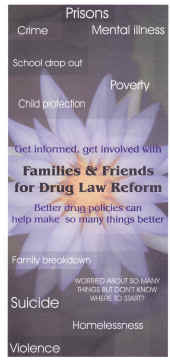
Cries of futility in dead ends of drug policy
By Neil Lade
Published in the Canberra Times 22 October 2006
Lost in an empty ring, going round in circles. Where words
drift into nothing and there's no escape from deja vu. Just blinding stupor in a
tunnel of darkness. And deep behind dark glasses no one can see my tears.
It's another time of year when futility struggles with
reality. When I'm drawn somewhat reluctantly to Weston Park in Yarralumla - and
wounds gape again. It's last Monday, and I'm back for the ACT Families and
Friends for Drug Law Reform's 11th Annual Remembrance Ceremony for those who
lose their life to illicit drugs.
It's surreal - tranquil, slightly disconnected. People of
all ages, slightly drooped. Kids, and a detached dog, wandering in and out.
VIPs standing stiffly in dark blue suits. Blossom flecks
from the locust tree floating like snow flakes in the breeze.
This is the seventh ceremony since my elder daughter Mel
died from a heroin overdose in 1999. Her casual use was just a small part of who
she was. It was a false solace when the black dog chased. She could light up a
room, a stage, any space - and she could plunge them all into darkness. She
tried so hard not to use, but it's not so simple - despite what fearless leaders
and sanctimonious tough-on-drugs protagonists say. It's so easy to preach from
ivory towers of intransigence, mired in narrow views. Just say no, and it all
goes away. But it hasn't. It's been sidelined, but it thrives in hell.
Keynote speaker Tony Trimingham illustrates this all too
clearly. He's the founder and head of Family Drug Support, which, among other
things, offers a seven-day, 24-hour-help phone line Australia-wide (1300 368
186). Tony's son Damien died of a heroin overdose in 1997, and he talks
about the hole that's still there. That's when I start crying. I know that hole.
He talks also about modern perceptions. He rang a Sydney newspaper recently and
one of the big-wigs said, ``But heroin's not an issue any more.'' But it is, of
course. And drug abuse in general. The frightening death tolls of 900-plus in
the late '90s have gone, but Tony says the death toll is still about 300 a year.
Suddenly I'm back to where I've been before. Over and over
again. In head-banging, mind-numbingly obvious. That nothing has really changed.
No one likes what addicts do - especially if you're a victim of attack, break-in
or theft. But perhaps things would be better if they were in the health rather
than the criminal system. Ruled by sanity rather than morality where the mindset
of abstinence rules.
By the time I refocus, another speaker is in mid-stream.
Australian Democrats leader Lyn Allison says that ``a criminal justice approach
to drug policy does not work''.
So says all of me. But her words float in dead-end
directions. And when Catholic Bishop Pat Power says, ``Don't lose hope,'' I just
say, ``No.'' Though it does seem hopeless when he reads out 170 names of
people who have died in their own wars against drugs. When he calls out
"Melanie Van Den Heuvel, aged 22, 1999'', all I can do is cry.